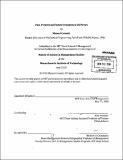| dc.contributor.advisor | Alex Stomper. | en_US |
| dc.contributor.author | Corsetti, Manuel | en_US |
| dc.contributor.other | Sloan School of Management. | en_US |
| dc.date.accessioned | 2010-10-12T16:29:37Z | |
| dc.date.available | 2010-10-12T16:29:37Z | |
| dc.date.copyright | 2010 | en_US |
| dc.date.issued | 2010 | en_US |
| dc.identifier.uri | http://hdl.handle.net/1721.1/59134 | |
| dc.description | Thesis (S.M.)--Massachusetts Institute of Technology, Sloan School of Management, 2010. | en_US |
| dc.description | Cataloged from PDF version of thesis. | en_US |
| dc.description | Includes bibliographical references (p. 55-59). | en_US |
| dc.description.abstract | This thesis reviews how oil price has evolved throughout time since it was discovered and commercially exploited in 1859 in Pennsylvania. Rather than a pure economic study, this thesis illustrates how major historic and geopolitical events have been influenced or driven by a frantic quest for oil. Oil has allowed the automotive industry to thrive, the industrial revolution to shift gears and has fueled economic growth especially in the USA and the western countries throughout the twentieth century. Oil has also played a major strategic role during WWI and WWII. More recently, Oil has also been used as an economic weapon in several occasions. During the first and the second oil crises, producing countries have created OPEC in order to control prices in an attempt to get autonomy from consuming countries who had historically manipulated the prices thanks to the "Seven Sisters" regrouped in an illegal but extremely powerful "Oil Cartel". In the 1980's Reagan's Administration has successfully used oil as an economic weapon to fight the Soviet Union which eventually collapsed. With "Peak Oil" now approaching (some say already reached) oil prices are more and more difficult to manipulate. As supply now struggles to match demand, oil prices are more and more driven by macroeconomics fundamentals but this doesn't mean that speculation has no impact as we have seen recently during the 2007- 2008 bubble. To end with, this thesis concludes showing that if the past evolutions of oil prices are pretty well understood, predicting future prices is an exercise that requires utter humility. | en_US |
| dc.description.statementofresponsibility | by Manuel Corsetti. | en_US |
| dc.format.extent | 59 p. | en_US |
| dc.language.iso | eng | en_US |
| dc.publisher | Massachusetts Institute of Technology | en_US |
| dc.rights | M.I.T. theses are protected by
copyright. They may be viewed from this source for any purpose, but
reproduction or distribution in any format is prohibited without written
permission. See provided URL for inquiries about permission. | en_US |
| dc.rights.uri | http://dspace.mit.edu/handle/1721.1/7582 | en_US |
| dc.subject | Sloan School of Management. | en_US |
| dc.title | Past, present and future evolution of oil prices | en_US |
| dc.type | Thesis | en_US |
| dc.description.degree | S.M. | en_US |
| dc.contributor.department | Sloan School of Management | |
| dc.identifier.oclc | 659509828 | en_US |
